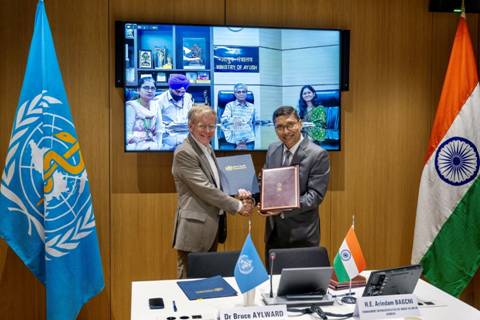GG News Bureau
Geneva, 2nd August. The Ministry of Ayush, Government of India, and the World Health Organization (WHO) signed a Donor Agreement at a ceremony held at WHO Headquarters in Geneva on July 31, 2024.

The agreement, detailing the financial terms for the activities of the WHO Global Traditional Medicine Centre (GTMC) in Jamnagar, Gujarat, was signed by Arindam Bagchi, Permanent Representative of India to the UN, Geneva, and Dr. Bruce Aylward, Assistant Director-General for Universal Health Coverage and Life Course, on behalf of the Ministry of Ayush and WHO respectively.
Vaidya Rajesh Kotecha, Secretary of Ayush, participated virtually in the event. Dr. Shyama Kuruvilla, Director a.i. of WHO GTMC, moderated the event, while Dr. Razia Pendse, Chef de Cabinet representing the Director-General of WHO, delivered the vote of thanks.
Through this collaboration, the Government of India will donate US$ 85 million over ten years (2022-2032) to support the operations of the WHO GTMC in Jamnagar. The Donor Agreement acknowledges the establishment of the WHO GTMC as a key knowledge hub for evidence-based Traditional Complementary and Integrative Medicine (TCIM), aiming to advance global health and well-being.
With Union Cabinet approval, a Host Country Agreement was signed on March 25, 2022, between the Ministry of Ayush and WHO, marking the establishment of the WHO GTMC in Jamnagar as the first global out-posted Centre for traditional medicine.
The interim office of the WHO-GTMC is already operational, developing capacity-building and training programs in partnership with the WHO Academy and other strategic partners. These programs include campus-based, residential, or web-based training relevant to the Centre’s objectives.
The Ministry of Ayush has collaborated with WHO on various fronts, including developing benchmark documents for training and practice in Ayurveda, Unani, and Siddha systems, creating WHO terminology for these practices, introducing a second module in the Traditional Medicine Chapter of the International Classification of Diseases-11, developing apps like M-Yoga, and supporting the International Pharmacopoeia of Herbal Medicine (IPHM). These efforts, including those involving the WHO GTMC, will help position traditional medicine on the global stage.
The joint efforts of the Ministry of Ayush and WHO will not only benefit India but also contribute to the global health agenda, reinforcing a commitment to achieving the Sustainable Development Goals through Traditional Medicine.


Comments are closed.